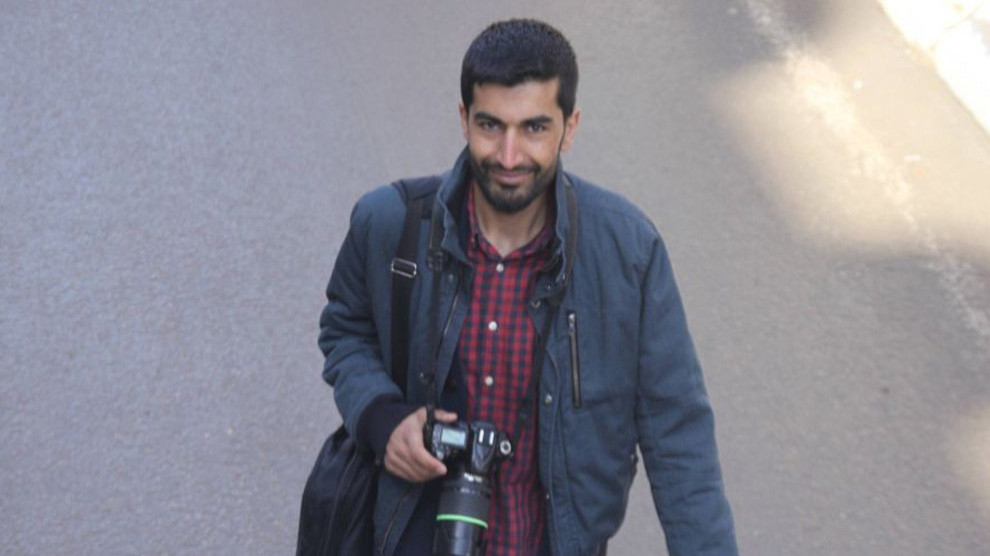Jailed journalist: No Corona prevention in prisons
Kurdish journalist Nedim Türfent contradicts the government’s claims that preventive measures against the corona virus have been taken in Turkish prisons.
Kurdish journalist Nedim Türfent contradicts the government’s claims that preventive measures against the corona virus have been taken in Turkish prisons.

Kurdish journalist Nedim Türfent, who is imprisoned in the high-security prison of Van, contradicts the Turkish government’s statements according to which preventive measures have been taken in Turkish prisons against the introduction of the novel coronavirus. Claims that all necessary measures have been taken to protect prisoners are simply false, Türfent explained in a telephone conversation with his relatives.
The detainees were quite astonished when they listened to a statement to that effect from the Minister of Justice. A bottle of disinfectant was placed in front of only a few cells, Türfent said. Demands for further disinfectants, Kolonya (Eau de Cologne) and breathing masks were not met by the prison administration. In principle, the latter could be bought in the prison canteen, but for a high price of 17 Turkish Lira (about 2.40 Euro). A price that few of the approximately 300,000 prisoners in the country's overcrowded prisons can afford.
Van borders with Iran
The province of Van borders Iran, one of the countries most affected by coronavirus. According to Türfent's relatives, this is why immediate protection measures are needed, especially for the many sick prisoners. According to the latest figures of the human rights association IHD, 1,334 prisoners in Turkish jails are currently ill, 457 of them are in life-threatening condition. Thus, they belong to the group of persons with an increased risk of serious Covid-19 disease. According to the management of the high-security prison in Van, however, descaling agents and detergents are sufficient as protection against the corona virus, family members quote the journalist as saying. Türfent demands the immediate release of all sick prisoners. In addition, the judicial reform announced months ago must finally be debated in parliament, he says.
HDP calls for the release of prisoners
The HDP, too, calls for the release of sick and elderly prisoners as well as minors and mothers with children in order to protect them from the spread of the coronavirus. In addition, the right to telephone communication is must extended, says the party.
Arrests for doubts about official statements
The actual extent of the spread of coronavirus in Turkey is unclear. According to the Minister of Health, Fahrettin Koca, there are 47 infected so far. 29 of them are people who have recently arrived in Turkey from the USA, the Middle East and Europe. Three others are pilgrims. As the neighbouring country Iran is one of the most severely affected by the pandemic worldwide, these figures do not seem credible, many believe. 19 people in Turkey who had expressed doubts about this account in social networks have already been arrested. A search is underway for 74 more.
Who is Nedim Türfent?
Nedim Türfent, correspondent of the DIHA news agency, which has been banned by emergency decree, was arrested in Van in May 2016. Previously he had reported on the abuse of power by Turkish state officials. Specifically, it was about a video recording from August 2015 from the province of Hakkari. The video shows a special unit of Turkish security forces handcuffing several dozen workers at a construction site and forcing them to lie down on the ground.
In the background there is shouting, racist insults and threats. Towards the end of the video the following sentence is heard: "Now you will feel the power of the Turks!" And further: "I know your faces now. "Those who betray us will face the consequences. What has this state done to you? Now you will feel the power of the Turks".
After Nedim Türfent reported on the incident, he was threatened several times - among others by JITEM, the informal secret service of the Turkish military police (gendarmerie). He was prevented from researching and reporting, and was eventually arrested on the basis of fake investigations. The charge against the journalist was only drawn up after he had spent thirteen months in custody. The responsible public prosecutor saw sufficient evidence in Türfent's journalistic activities and his articles to demand a prison sentence of more than 22 years.
On 15 December 2017, the journalist was sentenced to seven years in prison for "membership of a terrorist organisation". Later on, the term of imprisonment was extended to eight years and nine months because of the "persistence of the offences". At the beginning of October 2019, the verdict was confirmed by the Turkish Court of Cassation.
RELATED NEWS: